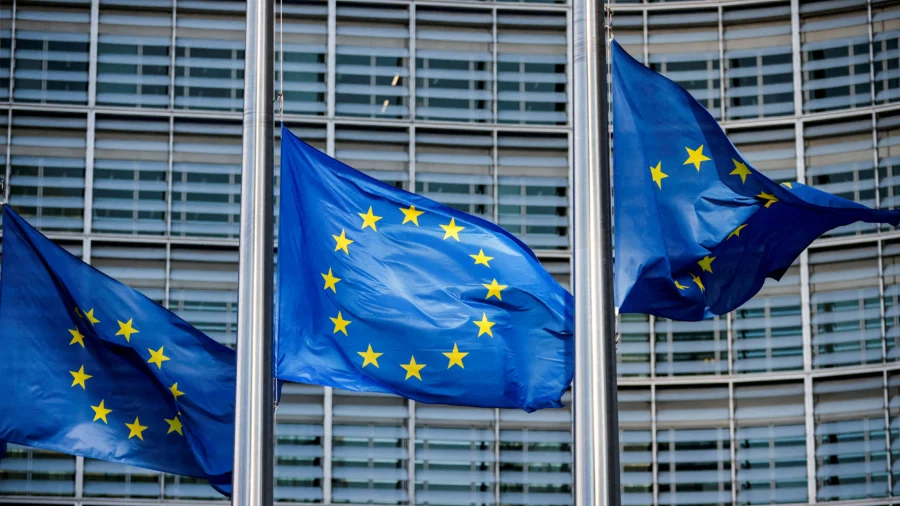Businesses in the EU Held Hostage by U.S.-China Tensions
Businesses within the European Union find themselves in a precarious position amid the escalating friction between two of the world’s largest economies: China and the United States. According to Jens Eskelund, the president of the European Union Chamber of Commerce in China, these companies are effectively being held “hostage” as they navigate the complexities of international trade relations in a time of uncertainty and geopolitical strife.
Collateral Damage in Trade Relations
Eskelund, in an exclusive interview with Nikkei Asia, discussed how the EU has been experiencing “collateral damage” due to the tumultuous relationship between China and the U.S. Despite the recent announcement of a tentative trade deal between the two superpowers, the EU continues to feel the negative repercussions of these disputes. U.S. President Donald Trump noted that China would assure upfront supplies of crucial resources like rare earths and magnets; however, a definitive agreement remains elusive.
The Impact of Rare Earth Export Controls
One of the primary concerns raised by Eskelund is China’s implementational of stringent export controls on rare earth elements, which are indispensable for numerous modern technologies such as electric cars, wind turbines, and military hardware. Although these measures are claimed by Beijing to be a counteraction against U.S. tariffs, their implications stretch far beyond American borders. European businesses are often left entangled in bureaucratic procedures and excessive documentation requirements, causing considerable delays and uncertainties in securing necessary export licenses.
Transparency and Supply Chain Security Risks
According to Eskelund, China’s insistence on transparency in supply chains reflects its desire to prevent the U.S. from indirectly acquiring these critical minerals through third-party nations. This stringent oversight, while aimed at safeguarding national interests, inadvertently strains the EU’s relations with China. Businesses find themselves caught in a tug-of-war, complicating their operations and affecting their strategies in the region.
Calls for De-risking from China
The prevailing uncertainty has incited a wave of urgency within the EU to "de-risk" its economic relationships with China. As Eskelund points out, the EU’s need for diversification in supply chains is becoming increasingly critical. This sentiment is echoed by European Commission President Ursula von der Leyen, who, during a G7 summit in Canada, cautioned against a “new China shock.” Her remarks draw attention to a broader trend of discontent regarding China’s economic behavior and its impact on international trade.
Growing Friction and Critique of Chinese Practices
Von der Leyen’s statements reflect a growing sentiment among EU leadership that China’s approach to global trade may be employing intimidation as a tool to maintain its dominance in manufacturing and supply chains. She criticized China’s tendency to undermine intellectual property protections and their use of substantial government subsidies to distort competition. This creates an atmosphere of unease as EU member states seek to establish a coherent and unified stance in light of these challenges.
China’s Response to Criticism
In response to the criticisms levied by von der Leyen, Beijing has expressed “strong dissatisfaction and firm opposition." Chinese foreign ministry spokesperson Guo Jiakun’s remarks underscore the heightened tensions between the two sides, illustrating that diplomatic language is becoming increasingly fraught as both parties vie for positioning on the global stage.
Monopoly on Rare Earth Elements
At the core of the discussion lies China’s dominant control over the rare earth elements market, commanding around 60% of the global supply and 90% of refining capacity as reported by the Center for Strategic and International Studies. This overwhelming influence positions China not only as a supplier but also as a potential adversary in international trade negotiations. Von der Leyen emphasized the strategic implications of this quasi-monopoly, indicating that these elements are being weaponized to disadvantage competitors in essential industries.
Concerns Over Economic Outlook
Lastly, the unease surrounding U.S.-China dynamics is compounded by the overall economic outlook in China. An annual survey conducted by the EU Chamber of Commerce in China reported that nearly three-quarters of its members find it progressively more difficult to conduct business in the country. This feeling of dwindling optimism marks four consecutive years of heightened concern over the operational landscape within China, affecting companies ranging from established industrial giants like Volkswagen to smaller enterprises intertwined in global supply chains.
As European businesses wrestle with the implications of these geopolitical tensions, the path ahead is filled with uncertainty, revealing both challenges and opportunities for adaptation in an evolving global trading environment.


